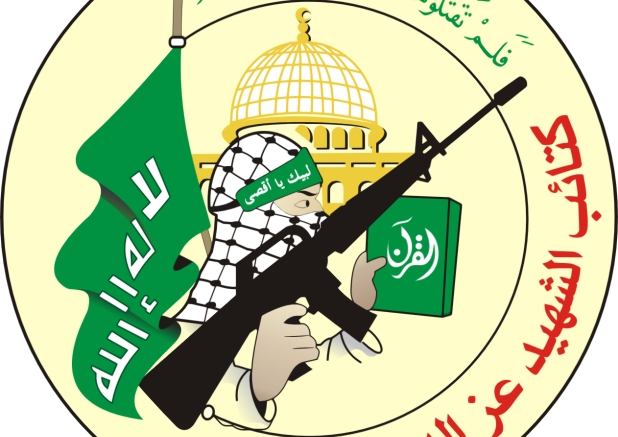
The logo of the Al Qassam Brigade, the armed wing of Hamas
Last week, Hamas’ militant wing the Iz Al Din al Qassam Brigades announced via their website that their primary English-language Twitter account, @alqassamBrigade had been suspended. The group said : “The Qassam Brigades confirmed that they did not violate Twitter’s terms of service ever … Twitter still not sending Al Qassam any justifications for the suspension.”
When asked by Index why the account was suspended, a spokesperson from Twitter responded: “”We do not comment on individual accounts, for privacy and security reasons.”
Twitter’s decision to suspend the account becomes evermore confusing beyond this first glance. If the goal is to prevent Al Qassam from using Twitter, it’s ineffective, as their secondary English-language account as well as a primary Arabic account are both still active- not to mention the ease with which a new account can be created. It’s difficult to see what closing the account achieved other than giving a group that, by definition feeds off exclusion from the mainstream, fuel for pariah status.
Moreover, the timing of the decision appears to be somewhat out of the blue. If Twitter was truly concerned about inflammatory remarks, then they would have suspended the account back in November 2012, when Al Qassam and the Israeli Defence Force used Twitter to bait one another during the last Gaza war. This period set a new bar in terms of direct and hostile communication via Twitter, not just between Al Qassam and the IDF but also by their supporters. Objectionable though some of it may have been, Twitter never interfered with the fray.
Nonetheless, this particular corner of the Internet is constantly caught between the need that websites such as Twitter act as a transmitter of free speech, and the extreme pressure that it is subjected to by interest groups. On the 20 November 2012, “Christians for a United Israel” filed a petition with Twitter to close Al Qassam’s account, on the grounds that it counted as “material support” for an internationally recognised terrorist group, Hamas.
But as David Cole pointed out in a piece for the Daily Beast’s Open Zion blog at the time, the terms of what constitutes this “material support” are so broad as to be almost meaningless – and Gaza is filled with so many international products that it could be argued that Coca Cola, ExxonMobil and a large number of Israeli products that are regularly exported to Gaza are also supporting Gaza’s ruling Hamas party. Twitter is simply a conduit – as Cole points out, “Twitter is for all practical purposes a ‘common carrier’, providing its service to all comers. Would we hold a telephone company responsible for allowing a gang to use its phone lines to plan a crime, or the Postal Service responsible for delivering a package of drugs?”
The other curious element about this timing is that the suspension comes at a time when jihadist accounts are proliferating on Twitter, in Arabic and in English. Jihadist individuals and groups within Syria have increasingly taken to social media as a way to spread a message about their beliefs and intentions as part of Syria’s civil war. Individual members of Jabhat Al Nusra and increasingly ISIS have used Twitter as a means of provoking one another off the battlefield. While this may not be the official accounts of each group tweeting, it is not so different in content from anything that Al Qassam have tweeted recently. If Twitter were truly concerned about the content of Al Qassam’s account, then they would have been forced to close far more than just the one.
Terrorist groups using different forms of media to transmit their message to a wider public is nothing new. Complaining that Twitter helps terrorists talk to the public sounds as outdated as complaining that Al Jazeera broadcasted statements by Osama bin Laden: in this sense, the medium is not the message.
To consider the alternative for a moment: Gaza is not a haven for free media. Journalists of any nationality that operate on the ground there do so under heavy restrictions from a variety of parties. Beyond the day to day restrictions on their movement, speech and work, talking directly to the Al Qassam Brigades is almost impossible. Social media, while potentially a tool for propaganda, is one of the few ways that the wider public is able to know what is happening inside Al Qassam Brigades and Hamas. Cutting off this line further maligns part of a regime that uses this seclusion to its political advantage within Gaza, and allows Hamas to further clamp down on free speech within the Strip. In short: the content may be a strange development on Twitter, but its absence potentially has tangible effects for people on the ground.
This article was posted on 20 January 2014 at indexoncensorship.org





